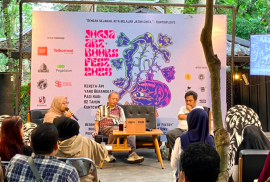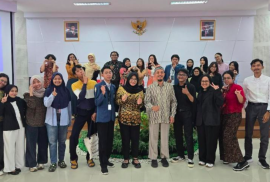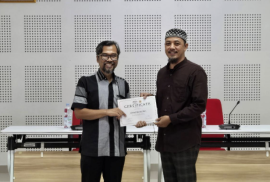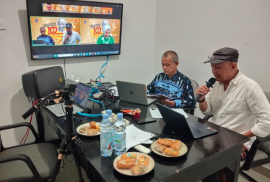Yogyakarta, May 21, 2025 — The re-launch of Kereta Api yang Berangkat Pagi Hari by Kuntowijoyo marked a special moment at the 2025 Jogja Art + Books Fest. Held at The Ratan, Bantul, the event was attended by academics, literary activists, and literature enthusiasts. The launch discussion featured Prof. Faruk H.T. (Lecturer in the Master’s Program in Literature and Literary Critic) and writer Mahfud Ikhwan as keynote speakers, with Amanatia Junda serving as moderator.
Originally written by Kuntowijoyo in 1964, the novel is set against the backdrop of the 1949 Indonesian revolution. Rather than emphasizing heroism, the story portrays village life, interpersonal conflict, and a collective search for the meaning of independence in a more humanistic light. This work is especially important to revisit today, notably for its unique sense of locality and spirituality.
In his presentation, Prof. Faruk highlighted that the novel expresses a spirit of reconciliation and communal cooperation as a way out of socio-political conflict. “This novel offers a communal solution to the tensions of that time—between the colonizers and the colonized, between nationalists and traditional elders. Its foundation is oral tradition, and forgiveness is the key theme,” he explained. This underscores an effort toward ideological reconciliation after conflict.
Mahfud Ikhwan, affectionately known as Cak Mahfud and widely recognized for his deep interest in the history of Indonesian literature, noted that the novel had long been “forgotten” and seldom read by the younger generation. He also drew attention to the historical context of Kuntowijoyo’s creative process. “The novel was written between 1963 and 1964, but it is often associated with the events of 1965. This is interesting because we might ask whether Kunto was responding to the events of 1949 or actually preparing for 1965,” he remarked.
The re-publication of this novel was initiated by Dodo Hartoko through Pabrik Tulisan Publishing, with illustrations by Enka Komariah. “Our hope is that this work can reach younger readers without feeling outdated or vintage,” said Dodo in his opening remarks. The new edition features a minimalist and modern design while remaining faithful to the original manuscript. He also emphasized that the setting of the story—Ngawonggo, Ceper—further strengthens the novel’s local thematic character.
The discussion session was lively and interactive. During the Q&A, Arif Kurniawan asked, “If Kuntowijoyo were given the opportunity to write and respond to today’s chaotic political landscape, what would come out of his typewriter?” Prof. Faruk responded by reflecting on Kuntowijoyo’s creative trajectory. “If we look at his first novel, it was very spontaneous, with little control—like the author was directly conversing with the reader. Over time, his writing became more disciplined and autonomous, as though the author gradually stepped back. If Kuntowijoyo were still alive and responding to today’s issues, perhaps his writing would be more realistic, yet still carry his prophetic mission,” he stated. Mahfud added that Kuntowijoyo’s authorship evolved alongside his deepening Sufi ideology: “Kuntowijoyo’s works do not merely record history—they provide meaning through spirituality. If he were writing today, that would likely still define his style.”
The re-launch of Kereta Api yang Berangkat Pagi Hari not only marks the return of one of Indonesia’s important literary works to the public eye but also underscores the significance of preserving classic literature. This event is part of the Jogja Art + Books Fest 2025’s broader mission to position Yogyakarta as a collaborative space for art, literature, and critical discourse. Kuntowijoyo’s work, in this context, is not merely read as a historical document, but as an interpretation of Indonesia’s present and future.
[Public Relation Magister of Literature, Marsya Kamila]






